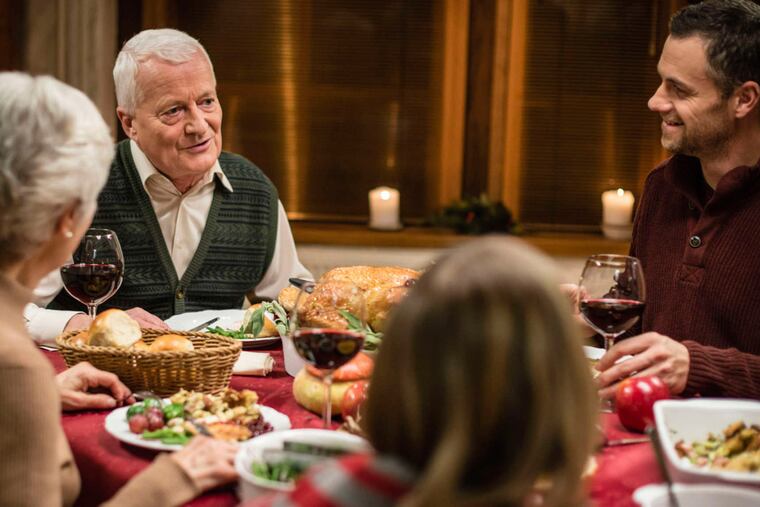Holiday visit offers good opportunity to assess health needs of aging relatives
The winter holidays - starting with Thanksgiving this week - can be much more than a time for families to gather and celebrate.

The winter holidays - starting with Thanksgiving this week - can be much more than a time for families to gather and celebrate.
Mike Newell, a certified critical care nurse and case manager, says the visit to Grandma can also be an excellent time to assess how she is faring and consider whether you need to take extra steps to care for her.
Newell is founder of Lifespan Care Management in Haddonfield. The company (www.lifespancm.com) offers health coordination and advocacy services for individuals and families. The goal is to advise families and help them get quality medical care.
But families can help. And a holiday visit offers a good opportunity to assess your aging relative, possibly preventing a catastrophe, Newell says.
Q: Why is this important?
A: A lot of people don't see their mom or dad for months, it might be. As they're aging, you're going to see some slip-ups, and you should not just take them in stride. You need to follow up.
Whether they are home or in a facility, you want to get a sense of: Is their life coherent? Is it moving forward? Have they stopped anything because of impairment?
Pay attention rather than just keeping to the same, "How about those Eagles? How about the weather?" You want to drill down into how they're doing. Are there any flags that could indicate their safety might be compromised? The signs can be easily recognized by a lay person.
What are some examples?
One of the things to notice is what we call the get-up-and-go test. Do they have a hard time getting out of the chair? When they turn, do they look a little unsteady? Have they had any falls? Evidence of falls might be bruising on the head, face, or hands.
Another problem with bruising: A lot of elderly people are on a blood thinner, which is difficult to adjust to. If they take a blood thinner and pain medication, ibuprofin or naproxen will multiply the effect of the blood thinner. If bruising is on their hands, they may be losing some blood in their stomach. They may have chronic anemia. So you'll want to see, do they look paler than they did before?
The other thing is dehydration. Most elderly people lose their sense of thirst, so they're not drinking much water.
This is particularly true if they're on a diuretic. It's very annoying: You take this pill, then you have to run to the bathroom all morning. They don't want to do that. So you want to look at their lips or their tongue and see if it's dry. Or on their hand, just pinch their skin a little bit. If it stays up like a tent, they're very dehydrated.
These things - dehydration, anemia, and if they're overmedicated with blood pressure medication, anti-anxiety medication, or anti-depression medicine - any combination can lead to falls. That's why you want to see how they get up.
Falling is the most significant problem leading to loss of independence. They fall and break their hip or leg. They wind up in the hospital. So now they can't do stairs. Now they have to have a walker. Now they have to give up driving. Fifty percent of elderly people who that happens to never return to their previous level of function.
Many elderly people keep their living quarters warmer. Is that OK?
Because your heart function isn't what it used to be, the circulation to the periphery - the toes and fingers - is not that robust. They think it's cold. It's actually that their cardiac function isn't that great. So they dial up the heat. And then that heat will dry them out.
What about dementia or memory problems?
Notice if their fridge is in disarray, if there are a lot of broken things that are unrepaired. Notice if there are a lot of bills that haven't been paid, if their checkbook is in disarray.
Look at the mail. A lot of older people get all kinds of mail because they contribute to this or that, and then they get flooded with appeals, then they write checks.
People whose eyesight isn't so good, and their hearing isn't so good, and they're living alone, are set up for cognitive impairment because they're not getting stimulation. That evolves slowly over time. But if they're socially isolated, who's going to know?
Give them a pop quiz: "Name as many animals as you can in a minute." If they name 15, they're good. If they name 12, they're mildly impaired. If they name nine, they're moderately impaired. If they can't name nine, we have a problem.
Some of these tests aren't exactly subtle. I can imagine Grandma balking.
The main thing is that you want to be observant. You're just looking for changes. If their ankles are swollen and they can't get their shoes on, they may have congestive heart failure.
When you ask certain questions, they'll say, "Well, that's a stupid question. I'm not answering that." That's because they don't know. They want to maintain control, so they're going to push back until they can kind of figure out the answer. But maybe they can't.
The major thing about loss of memory and cognition: A lot of people brush that off until it gets really obvious and you can't brush it off any more. But as it progresses, there's less and less you can do about it. If they're showing memory issues, don't just cross your fingers and hope that it's going to be OK. It's not going to be OK.